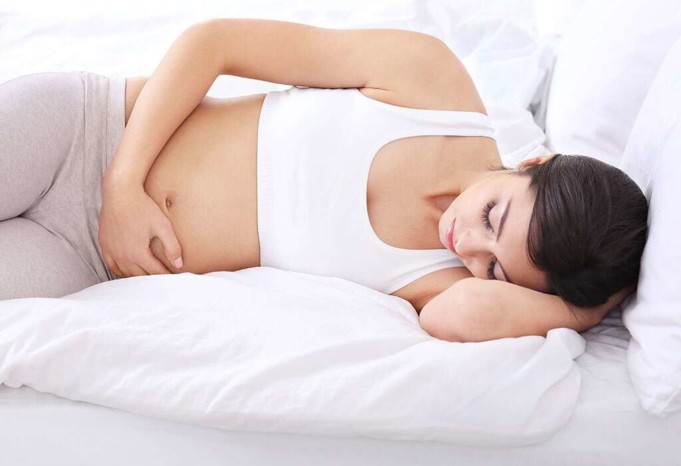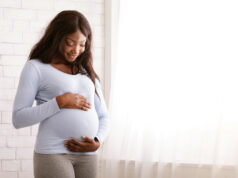Getting enough sleep during pregnancy could be difficult. Different sleeping positions while pregnant and sleeping aids should be considered for a good night sleep that keep both the pregnant woman and the baby healthy.
A variety of ways how to sleep is possible to ensure for better sleep during pregnancy such as:
- Turn of the light and keep the curtains and blinds closed so that the room is dark and quiet. Artificial light can disturb natural sleep and can also mess with your sleep cycle, because the light inhibit the production of the hormone melatonin.
- Keep the bed for sleep and sex only because your body needs to know that your bed is only for resting. Do not do your work on your bed such as working on emails with a laptop.
- Unplug well before bedtime and stay away from any external stimulation a few minutes before you go to bed, such as smart phones, television, newspapers and/or any light or noise. Do not engage in strenuous activities such as cleaning the house; late night workouts, because that will keep you too wired up to relax and sleep.
- Turn down the temperature because body heat increases during pregnancy and you might be feeling hot all the time. If your room is too stuffy and hot then you might not sleep well. Find a temperature that is most comfortable for you and experiment with the thermostat by turning it a few degrees lower than what you are used to normally. Setting the thermostat to the low 60 degrees Fahrenheit is an ideal sleeping temperature.
- Short and sweet naps for no longer than 30 minutes is ideal to rest, but if you sleep longer, the body will enter the stage of deep sleep which will make it harder for you to wake up, and may left you feeling groggy. The perfect treatment for daytime fatigue, is to take a few naps during the day.
- Comfortable bed is necessary since your spine feels more pressure than normal. Use different size pillows to elevate your body which can also relieve back pain. Add a mattress pad if you have a lot of back pain and/or sore muscles from a mattress that is not giving enough support.
- Do not toss and turn when you can’t sleep, get up and do something boring such as walking around the house or folding the laundry. Such mundane tasks are usually a bore and calm you down a bit so that you can go back to bed and sleep.
- Prop your body by using firm pillows to prop your head and upper body a few inches which allow for less pressure on your diaphragm and makes breathing easier. Support for the stomach can be get by strategically placed pillows and also promote better sleep. A full body pillow is very supportive. Elevating your upper body with pillows can help alleviate breathing problems associated with hormone changes during the pregnancy and take pressure of the uterus and lungs also preventing heartburn.
Sleeping on your stomach after the fifth month of pregnancy, is not a good idea and neither is sleeping on your back after about the 16th week of pregnancy.
The pregnant woman feels drowsy all the time; low energy levels; lethargy and overwhelming fatigue during the first trimester of pregnancy. This is due to the dramatic rise in progesterone and also the metabolic changes in the body with the growing fetus taking up every bit of the woman`s energy.
Avoid sleeping on your back after the first trimester because the weight of the uterus presses on the vein that returns blood from the lower body to the heart that could inhibit the oxygen supply and nutrient supply to the baby as the blood supply slows down.
Sleeping on your back causes the weight of the uterus to press on the spine; back muscles and major blood vessels that decrease the blood flow around the baby and your body. It can also prevent the baby from getting enough oxygen.
Sleeping on your back can cause some problems such as:
- Muscle aches and pains
- Hemorrhoids
- Swelling
- Drop in blood pressure
- Snoring
- Kidney conditions
- Hypertension
- Varicose veins
Reasons why sleeping on your left side during pregnancy is so important:
- The safest sleeping position and the best side to sleep on during pregnancy is on your left side with your knees bent for maximum blood flow to all the other major organs in the body.
- Use a pregnancy pillow and pillows under your belly; between your legs; behind your back and/or below the hips which help balancing on the side more easily.
- The use of a wedge-shaped cushion under the abdomen helps bearing the weight of the body (especially if you are expecting twins), and increases sleep.
- Sleeping on your side during the third Trimester of the pregnancy, reduce the pressure on the uterus; makes breathing easier and help relieves backaches.
- It will also take the stress of your lower back; help prevent snoring and increase circulation for the baby.
- Because the liver is located on the right side of the body, it is safer to sleep on the left side which prevents the uterus pressuring this vital organ.
- Sleeping on the side helps the kidneys to get rid of fluids and waste products from the body, and this reduces any swelling in the ankles, feet and hands.
- The risks of stillbirth may be reduced by sleeping on the side.
Pregnant women may sleep more than usual especially during the first trimester as the body works to protect and nurture the baby.

A variety of good products are available to help promote better sleep such as pillows and mattresses especially designed for the pregnant women because enough sleep and using the best sleeping position by sleeping on the left side is important.
Author Bio:
Susy Richards is a lovely mother of 3 girls (3 years, 4 years and 5) and simple woman who is ready to share her priceless experience with other mommies around the world. She is an Advanced Practice Provider who passed birth doula and postpartum doula courses at Childbirth International in 2013.












